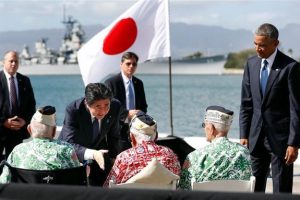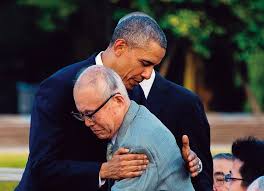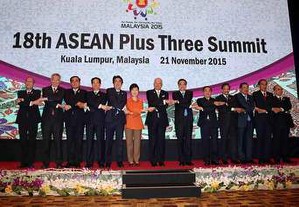It is the Grand Chancellor of China who controls the puppet emperor who is familiar with the Three Kingdoms. Shinzo Abe appeared on Nippon Television's special program "Direct Hit by Former Prime Minister Abe! The Future of the Japan-US Alliance, the Role of Japan, Domestic Politics [Deep News]" on the night of December 13, as if he were instructing Prime Minister Fumio Kishida.
■ Japan-US Reconciliation: Directing in Hiroshima and Pearl Harbor
 Mentioning the 80th anniversary of the attack on Pearl Harbor on December 8, he reiterated that today's Japan-US alliance is an "alliance of hope." The grounds for this were that the leaders of Japan and the United States visited Hiroshima and Pearl Harbor in 2016, respectively, and reconciled with each other with a spirit of tolerance.
Mentioning the 80th anniversary of the attack on Pearl Harbor on December 8, he reiterated that today's Japan-US alliance is an "alliance of hope." The grounds for this were that the leaders of Japan and the United States visited Hiroshima and Pearl Harbor in 2016, respectively, and reconciled with each other with a spirit of tolerance. Next, looking back on the talks at the beginning of the 70th year after the war in 2015, he said, "Not only focusing on deafeted country of Japan, but also thoroughly examining colonialism (of Western countries) since the 15th century, a focusing on victorious Europe and the United States.  He summed up the previous war as an interaction (between Japan and the victorious country side), and repeated his theory that "children, grandchildren, and future generations should not be destined to continue to apologize."
He summed up the previous war as an interaction (between Japan and the victorious country side), and repeated his theory that "children, grandchildren, and future generations should not be destined to continue to apologize."
 He summed up the previous war as an interaction (between Japan and the victorious country side), and repeated his theory that "children, grandchildren, and future generations should not be destined to continue to apologize."
He summed up the previous war as an interaction (between Japan and the victorious country side), and repeated his theory that "children, grandchildren, and future generations should not be destined to continue to apologize." In short, "Thanks to the efforts of the Abe administration, it was liquidated after the war and now Japan and the United States have become equal partners who share values. It is equivalent to declaring that both countries will contain China, which is a supremacy that changes the existing order, and will surely dismantle the Communist Party system. " "
This was a proxy for Washington's will, and threatened that "if we go off this line, there will be no tomorrow for the Kishida administration."
■ Urgent issue: Right-wing, retrospective politics
The show also included the arrogance of right-wing forces that could turn to anti-Americanism. The program was about to end with the new security legislation that made it possible to activate the right of collective self-defense as the best result of the Abe administration, but just before that, the moderator said, "What do you want to achieve the most in the future?" He answered, "It's a constitutional amendment."
I read that as long as the Liberal Democratic Party continues to raise the constitutional amendment head-on, it will be able to retain the right-wing nationalist forces that could lean from pro-American to anti-American.
Abe further concluded, "The opposition parties, especially the Constitutional Democratic Party, have said that they will not participate in the constitutional amendment debate as long as the Abe administration continues. I think that the possibility of constitutional amendment has increased because of the relatively liberal Kishida administration." ..
This remark is a shake to the Kochikai and Kishida factions, whose origins are postwar conservative politics, with protection, light armament, and economic priority. He instructed Prime Minister Kishida, "Don't break the constitutional amendment pose because it's okay to lie." I don't really think that a constitutional amendment banned by Washington is possible. Note 1 Note 1: Please refer to the article "Achieving Constitutional Amendment with My Hands" published on February 15, 2020, Prime Minister Abe's greatest falsehood-how are we deceived?
■ Right-wing repulsion: "The United States also smells like a toilet"
One of the origins of the Liberal Democratic Party's largest faction "Seiwakai" led by Abe is the National Assembly for the Establishment of the Voluntary Constitution led by Nobusuke Kishi, which beautifies prewar Japan with independence from the right. It was set aside by retrospectives and transnationalists.
They have been softened by secret funds from Washington through US intelligence and have helped crush Japan's leftists. The forces surrounding the Nippon Kaigi, which is Abe's supporter, have also been rounded up by the United States. Note 2 However, the decline of the Japanese economy and the relative poverty of the people, which is said to be the "lost 30 years," is the result of Washington's strategy to weaken Japan. It is well aware of the right-wing forces.
Through programs such as "Sakura Channel," the phrase "dirty toilets in both China and the United States" has been leaking for quite some time. Abe praised Sanae Takaichi (photograph), who had been appointed in the previous LDP presidential election, for a better fight than expected, and said, "This has brought back and retained the supporters on the right." In addition to clearly stating the constitutional amendment, it is essential to "select a successor" who says, "I will visit Yasukuni Shrine as soon as I become prime minister," like Takaichi.
Note 2: Please refer to the articles published on February 18, 2021 "Conservative" mainstream "reversal and US pressure: Anti-communist powers and Seiwakai rule 1" and "2".
■ Abe and Washington's public opinion work against Japan
Shinzo Abe has been buying American and British agents without hesitation. On December 1, 2021, he gave an online talk at a forum hosted by a Taiwanese think tank, stating that an armed attack on Taiwan would be a contingency for the Japan-US alliance.
"China's armed invasion of Taiwan causes a serious crisis for Japan." "It has become a contingency for Japan, and it is also a contingency for the Japan-US alliance." "It should never be mistaken," he said, "if Taiwan is strong, prosperous, and guarantees freedom and human rights, it will benefit not only Japan but the entire world."
 It was Abe again that he appeared to play a role in embracing ASEAN in the United States. 2022 will be the 40th anniversary of Malaysia's former Prime Minister Mahathir Mohamad, who was the leader of the anti-American non-aligned movement, advocating the Look East policy, "Learn from Japan."
It was Abe again that he appeared to play a role in embracing ASEAN in the United States. 2022 will be the 40th anniversary of Malaysia's former Prime Minister Mahathir Mohamad, who was the leader of the anti-American non-aligned movement, advocating the Look East policy, "Learn from Japan." Therefore, Abe himself sold to Prime Minister Kishida and was scheduled to go to the site as a Malaysian special envoy on December 3. However, US Secretary of State Antony Blinken will visit Indonesia, Malaysia, and Thailand from December 13 after the G7 Foreign Ministers' Meeting in Liverpool, England, and Abe has been dismissed. On December 2, Prime Minister Kishida held a telephone talk with Malaysian Prime Minister Ismail Sabri for about half an hour. At the summit meeting, ASEAN has set out its own "Indo-Pacific" concept, which states that it is not the Indo-Pacific with a Chinese restraint, and sets it apart from the "Free and Open Indo-Pacific" of Japan, the United States, Britain and Australia. It seems that I told the Japanese side again.
In any case, Washington's public opinion work against Japan will continue, with Abe as a loyal agent who professed to be "100% with the United States" while he was in office. How far can the Kishida-Kochikai Group endure this?
